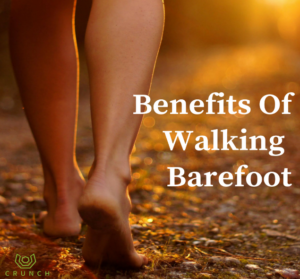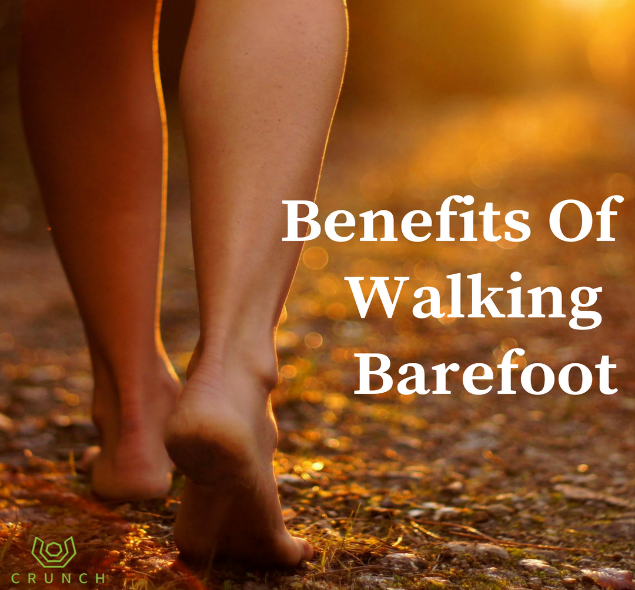By Prof. Raphael Nyarkotey Obu

The writer
Walking barefoot improves menstrual flow, eyesight, sleep, hypertension, pain, and inflammation.

Most of my articles are born out of inspiration. Others are requests from readers. I know this topic will shock many people. Others will also as usual think this is an ordinary Naturopathic Professor exploring extraordinary beliefs. Maybe, this is a Psychology of an extraordinary belief.
While subjective responses and anecdotal success stories may be enough to convince some, there are plenty of non-believers in the supposed benefits of sticking your bare feet on the ground.
But, I have been seeing a few people who walk barefoot. Most of these people are spiritualists. However, most of us do barefoot walking at home. Some adopt barefoot walking as a practice they do daily.
While walking barefoot is by no means a part of traditional medicine, it does belong to the group of practices that are becoming more socially accepted as an effective way of maintaining health. As more people begin to support and practice integrative medicine, it can be expected that walking barefoot will be socially reinforced and gain more popularity.
When a toddler is learning to walk, parents are told to let this process happen naturally, and without shoes. This is because shoes can affect how a child uses the muscles and bones in their feet. They also receive feedback from the ground when they walk barefoot, and it improves their proprioception (awareness of their body in space). However, in our quest to adjust to the modern world, we tend to shove our feet into shoes and therefore the child loses the importance that is attached to barefoot walking as the child gets older.
Also, walking barefoot in natural surroundings brings you in contact with the earth. This transfers the earth’s electrons into your body, inducing therapeutic effects. These include reduced inflammation, stress, and pain and improved mood and sleep.
I have been asked several times whether it is safe to walk barefoot. Hence, in this article, I examine the science behind barefoot walking and the side effects attached to it.
Earthing?
“Earthing” means walking barefoot on soil, grass, or sand (i.e. any natural surface). So, to reap the aforementioned benefits, you might have to get off the sidewalk.
The planet has its natural charge, and we seem to do better when we’re in direct contact with it.
Barefoot walking, Science
The important question I asked myself is whether there is any science in barefoot walking. I found one important answer from Dr. Jonathan Kaplan, foot and ankle specialist and ororthopaedicurgeon with Hoag Orthopaedic Institute. He asserts:
“The most straightforward benefit to barefoot walking is that in theory, walking barefoot more closely restores our ‘natural’ walking pattern, also known as our gait.”.
He further explains that if you go to any running or walking store and look at diverse pairs of shoes, you will notice that several of them have excessive cushioning and support.
While this pillow-type padding can feel pretty amazing when you walk in these types of shoes, board-certified podiatrist and foot surgeon Dr. Bruce Pinker says they can prevent you from using certain muscle groups that can strengthen your body.
Barefoot, decreases Inflammation
This question was answered in one study by Oschman et al. (2015) and found that:
Grounding (another name for direct skin contact with the surface of the earth) produced measurable differences in cytokines and compounds involved in the inflammatory process. This effect can be linked to the earth’s electrons. The study also found that walking barefoot improves our white blood cells and reduces pain.
This is because skin contact with the earth’s surface enables the spread of electrons from the earth to the human body. These electrons enter the body through specific acupuncture points and mucous membranes (residing right under the skin).
A previous study by Chevalier et al. (2012) explained that the antioxidants in our body are made of electrons, which help neutralize free radicals and eventually fight inflammation.
Also, the study found that grounding was also linked to lower anxiety levels. Subjects dealing with anxiety and depression, when grounded to the earth during sleep in their beds (using a conductive mattress pad), experienced improvements in their condition.
Let me state that though this study wasn’t conducted on subjects walking barefoot, however, the mechanism involved was the same.
Barefoot walking, improves cardiovascular health
Some studies have thrown light on the physiological effects of walking barefoot (grounding) in improving cardiovascular health. One such study conducted by Chevalier et al. (2013) found that barefoot walking helps to decrease blood viscosity levels, an effect that may lower hypertension. Due to the sample size, more studies are needed in this area to buttress the beneficial effects of walking barefoot on cardiovascular health.
Barefoot walking, changes the brain
An earlier study (Sokal and Sokal, 2011) found that earthing changed the electrical activity in the brain2, as measured by electroencephalograms. Fast forward, another study (Chevalier et al. 2012) found that grounding aided skin conductivity, moderated heart rate variability, improved glucose regulation, reduced stress, and support immune function.
Barefoot, immunity
Oschman et al. (2015) study affirmed that the transfer of electrons is the key to barefoot walking and enables the body to absorb and donate electrons to the areas that need immune support. The authors further held that the mere fact that we disconnect ourselves from the Earth may be a significant rise in inflammatory-related diseases that have wrecked our weak immune system, and this can be corrected by going back to the earth by barefoot walking.
The reason is that a lack of sufficient electrons in the body can weaken the mitochondria (structures in the body’s cells that are responsible for energy production), leading to chronic fatigue and other issues. Even a minor injury can become a long-term health problem.
Barefoot walking, Reduces Pain
Oschman et al. (2015) study further believe that when we walk barefoot, helps to reduce pain. This is done by altering the numbers of circulating neutrophils and lymphocytes. It also modulates various other factors linked to inflammation. It further leads to the rapid resolution of painful chronic inflammation. Ravi Teja Tadimalla’s (2022) article further highlights that this could even prevent the signs of inflammation following heat, swelling, and pain.
Barefoot, encourages sleep
Chevalier et al. (2012) study found that walking barefoot can also encourage better sleep. This is because the earth’s electrons spread to your body and cause multiple beneficial psychological changes, including enhanced sleep every night.
One article by Georgia Kinch (2012) reports that grounding also helps normalize the day-night biological rhythms. This helps you relax and sleep better. However, it is not recommended you take a walk (let alone walk barefoot) if you have a serious injury.
Barefoot, improves eyesight
Maybe, this could be a ridiculous assertion. However, one study, by Embong et al. (2015) explained that barefoot walking improving eyesight could be due to the reflex points on the foot that are connected to the optic nerves. Is this not surprising that one could improve his or her eyesight by just walking barefoot? Well, this activity doesn’t come without certain caveats. Let us explore them.
Barefoot walking, warnings
Jayasinghe et al. (2007) study found that barefoot walking could expose one to diabetic foot disease in those vulnerable individuals.
The Centers for Disease Control (CDC) affirms that walking barefoot on contaminated soil can also lead to hookworm infection. The larvae (immature worms) present in the contaminated soil can penetrate the skin of humans. This also applies to walking barefoot in areas usually associated with fungal infections. Andrew Ramirez, (2011) article also notes that areas such as swimming pools, locker rooms, the gym, and the beach are all affected.
Take Home
There is no prescribed duration for barefoot walking, but it is advisable to begin slow and practice walking for 10-15 minutes each day for the first few weeks to ease yourself into the habit.
There are many benefits one could derive from barefoot walking. For instance, Hollander et al. (2016) study found that walking barefoot may strengthen your feet and make them more flexible.
Also, walking barefoot does not cause nerve damage. However, those with existing nerve damage, such as peripheral neuropathy, should avoid walking barefoot to minimize the risk of further injury.
Note also that frequent walking barefoot for a long period may wear down the heel pads on your feet and lead to plantar fasciitis or heel pain.
A previous study also proscribes walking barefoot on concrete and other similar hard surfaces as this could put excess pressure on the heels and lead to foot issues over time (Mohamed et al. 2015).
In submission, walking barefoot has many benefits such as decreasing inflammation, reducing/eliminating chronic pain, improving sleep, increasing energy, normalizing the body’s biological rhythms, improving blood pressure, lessening menstrual symptoms, and dramatically speeding healing time (just to name a few). Therefore, make sure to walk in clean areas and follow good hygiene practices afterwards
NB:
Prof. Nyarkotey has strict sourcing guidelines and relies on peer-reviewed studies, academic research institutions, and medical associations to justify his write-ups. My articles are for educational purposes and do not serve as Medical advice for Treatment. I aim to educate the public about evidence-based scientific Naturopathic Therapies.
The writer is a respected Professor of Naturopathic Healthcare, a Medical Journalist, a researcher, an author, and a science writer. President, Nyarkotey College of Holistic Medicine & Technology (NUCHMT)/African Naturopathic Foundation, Ashaiman, Ghana. Currently BL Candidate at the Gambia Law School, Banjul. E. mail: [email protected].
References
- Hollander, K., van der Zwaard, B.C., de Villiers, J.E. et al.The effects of being habitually barefoot on foot mechanics and motor performance in children and adolescents aged 6–18 years: study protocol for a multicenter cross-sectional study (Barefoot LIFE project). J Foot Ankle Res 9, 36 (2016). https://doi.org/10.1186/s13047-016-0166-1
- Andrew Ramirez,(2011) Preventing and treating fungal infections. https://vitalrecord.tamhsc.edu/preventing-and-treating-fungal-infections/
- Hookworm(2022). https://www.cdc.gov/parasites/hookworm/index.html
- Embong NH, Soh YC, Ming LC, Wong TW. Revisiting reflexology: Concept, evidence, current practice, and practitioner training. J Tradit Complement Med. 2015 Sep 28;5(4):197-206. doi: 10.1016/j.jtcme.2015.08.008. PMID: 26587391; PMCID: PMC4624523.
- Oschman JL, Chevalier G, Brown R. The effects of grounding (earthing) on inflammation, the immune response, wound healing, and prevention and treatment of chronic inflammatory and autoimmune diseases. J Inflamm Res. 2015 Mar 24;8:83-96. doi: 10.2147/JIR.S69656. PMID: 25848315; PMCID: PMC4378297.
- Chevalier G, Sinatra ST, Oschman JL, Sokal K, Sokal P. Earthing: health implications of reconnecting the human body to the Earth’s surface electrons. J Environ Public Health. 2012;2012:291541. doi: 10.1155/2012/291541. Epub 2012 Jan 12. PMID: 22291721; PMCID: PMC3265077.
- Chevalier G, Sinatra ST, Oschman JL, Delany RM. Earthing (grounding) the human body reduces blood viscosity-a major factor in cardiovascular disease. J Altern Complement Med. 2013 Feb;19(2):102-10. doi: 10.1089/acm.2011.0820. Epub 2012 Jul 3. PMID: 22757749; PMCID: PMC3576907.
- Georgia Kinch(2012) Body-Earthing. https://u.osu.edu/vanzandt/2018/04/18/body-earthing/
- Jayasinghe SA, Atukorala I, Gunethilleke B, Siriwardena V, Herath SC, De Abrew K. Is walking barefoot a risk factor for diabetic foot disease in developing countries? Rural Remote Health. 2007 Apr-Jun;7(2):692. Epub 2007 Jun 15. PMID: 17571928.
- Sokal P, Sokal K. The neuromodulative role of earthing. Med Hypotheses. 2011 Nov;77(5):824-6. doi: 10.1016/j.mehy.2011.07.046. PMID: 21856083.




